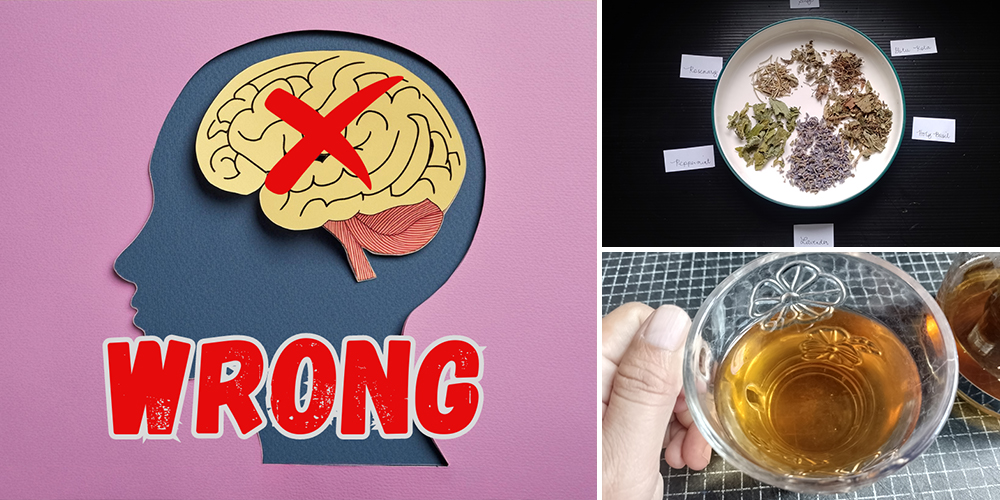
Stop Doing This! It Affects Your Brain
You may be hurting your brain in subtle ways you are unaware of. It mostly stems from habits that may cause irreparable damage if not addressed. Our lifestyle can take a toll on our brain health until it catches up with us.
The good news is, there are also plenty of ways to boost our brain health. The first step is avoiding and correcting those bad habits and supplementing the brain with the nutrients that it needs.
What Harms the Brain?
The brain is a mysterious organ that scientists speculated to generate as much as 23 watts of electrical power. It only reaches its full maturity at the age of 25 and is always active, contrary to claims that only 10% of the brain is working. The brain works even when we are asleep and you use all of it most of the time.
Our brain’s storage capacity is virtually unlimited as the neurons combine when it nears maturity. However, at a certain point, the neurons may also get damaged and stop working.
Here are some habits you need to stop as they endanger your brain:
Stressing a lot and Negativity
According to a journal, stress comes in three forms: good stress, tolerable stress and toxic stress. These stresses help the brain to become more resilient. However, chronic stress, or exposure to the same stressor for weeks can be detrimental. Chronic stress accelerates the brain’s aging and causes its degeneration.
⇒ The 4 Ingredients Blend That Helps Your Body Adapt to Stress
Sleeping less
Whatever the reasons for skimping on sleep, it can put undue pressure on the brain. As scary as it sounds, the brain is eating itself continuously to clear debris and shape memories. With too little sleep, it may start eating too much of its connections, synapses and worn-out cells, leading to neurodegenerative diseases.
Idling around
A sedentary lifestyle with little physical activity can speed up cognitive decline. Aerobic exercises get blood into the brain and improve its functions, which will happen otherwise if you lack exercise. Setting aside at least 30 minutes for moderate exercise may help revitalize the brain and prevent cognitive harm.
Eating unhealthy foods
Processed food, fast food, fatty foods and sugary drinks are all harmful to the brain. In a published meta-analysis in the Journal Nutrients, it was found that these foods are linked to the risk of depression and anxiety. Ultra-processed food can lead to chronic inflammation, hypertension, diabetes and heart diseases, which are precursors to vascular dementia. Smoking and alcohol are also detrimental to the brain and overall health.
Being alone
Loneliness and isolation do not only feel bad, they can also be damaging. According to a published journal Affective Neuroscience of Loneliness, subjective feelings of social isolation cause an array of biological and neural changes.
Too much time alone produces excess stress hormones and increased blood pressure and sugar levels. So, give yourself some time out, interact with others, and have long conversations with friends. Get involved in civic, religious and other activities to exercise the brain through socialization.
Having no leisure activities
Without any leisure or de-stressing activity, the brain is prone to cognitive decline and neurological problems. Leisure is imperative in our lives, mostly for the benefit of the brain. It supports mental health by relieving stress and improving resilience. Leisure activities can be outdoors, or just spending time learning something new, which counts as good brain exercise.
Spending more time on the screen
Screen time, either because of work or pastime, may damage the brain in the long run. The blue light that electronic devices emit can disrupt the sleep cycle. It can cause sensory overload and contribute to poor focus, which can trigger aggressive behavior.
Exposure to too much noise
Noise affects the brain in different ways. White noise and pink noise can stimulate the brain without distracting it. But, noise pollution (exposure to too much noise) from work can cause cognitive impairment and oxidative stress to the brain.
The WHO recommends only about 40 hours of weekly exposure to noise that is no higher than 80 dB in adults and 75 dB in children.
Air pollution exposure
High levels of air pollution have been affecting cardiovascular and respiratory health since 1970. Recent evidence also unfolds evidence of how it can be bad for the brain as well. It can damage children’s cognitive abilities and increase adults’ risk of cognitive decline and depression.
Living with a lack of green space
Green spaces are vital for environmental conservation and biodiversity. Living in crowded urban areas with lesser access to greenery can hurt the brain. It may cause acute psychological outcomes and increased risk of hyperactivity and dementia in the older population. Modern research reiterates the need for more green space in promoting mental health.
Helping the Brain with Herbs
Keeping the brain healthy is being aware of bad habits and avoiding them as much as possible. Feed your brain with a healthy diet and do not delay treatment for any health problem.
Brain-beneficial herbs are also a great help.
Lavender
Lavender (Lavandula angustifolia) is an anti-anxiety herb that promotes quality sleep and treats insomnia. It is a great herb to take for stress and depression, and for supporting brain health.
Lion’s Mane
Lion’s Mane mushroom (Hericium erinaceus) supports brain health by boosting memory and reducing anxiety and depression. It helps protect the brain and encourages the growth of new brain cells by promoting the production of nerve growth factor (NGF).
Cognitive function can decline so fast in a short amount of time. That’s why you should create a shield to protect it. A barrier against losing your sharpness. The most efficient way to protect it is to consume Lion’s Mane.
If you don’t have it on hand, I highly recommend you check out the Dual-Extracted Lion’s Mane Mushroom Tincture here!
Peppermint
Peppermint tea (Mentha piperita) is a refreshing and relaxing herb. Its uplifting scent helps clear the mind and de-stress the body for that feel-good feeling that calms the nervous system.
Rosemary
In a 2020 scientific review, it was found that rosemary (Rosmarinus officinalis) has therapeutic effects that may help with depression. Rosemary regulates the dopamine in the brain and also slows down or prevents cognitive decline due to age.
Gotu Kola
Gotu kola, or Indian pennywort (Centella Asiatica), has been used for many years in treating cognitive problems like Alzheimer’s Disease. It is considered as the fountain of youth for its anti-aging and neuroprotective properties.
Holy Basil
Holy basil, or tulsi (Ocimum basilicum), is regarded as a holy plant with excellent nootropic and neuroprotective properties. Present studies reinforce its traditional use as an effective treatment for lifestyle-related chronic diseases like diabetes, metabolic disorders and psychological stress.
Sage
Sage (Salvia officinalis) is one of the best herbs for improving memory. It slows down aging and speeds up the transmission of brain signals to ward off memory loss and support proper brain functioning.
Tinctures That Keep Your Brain Healthy
If making tinctures yourself at home is not your thing, I’ve got your back. Not only that you don’t need to look for ingredients in multiple stores, but making them is not a headache anymore. Cordyceps Tincture, Lion’s Mane Tincture, and Reishi medicinal mushrooms Tincture, plus a Lemon Balm tincture. All of those stress-free can be gotten in the deal right here in Nicole’s Apothecary. It’s called the Healthy Brain Bundle. Here’s what Martha says about this bundle:

Brain Supportive Tea Recipe
If you want to keep an active and sharp thinking, here is a potent herbal tea you can prepare. It is made from nootropic and brain-protective herbs to help minimize the strain our daily lives create in our nervous system.
You can use dried herbs for this recipe for a more concentrated flavor and potent effect.
 Ingredients
Ingredients
- ½ tsp rosemary
- Lion’s Mane Tincture (inside the Brain Bundle)
- ½ tsp sage
- 2 tsp peppermint leaves
- 2 tsp culinary lavender buds
- 2 tsp holy basil
- 1 tsp gotu kola
- 2-3 cups hot water
- Lemon and honey, optional
Steps
- Combine all the herbs in a tea infuser.

- Pour hot water over them and steep for 5 to 10 minutes or longer if you want a stronger tea.

- Pour into a cup and flavor with lemon and honey if desired.

To use: Take a cup of this organic tea an hour before bedtime to help you relax and unwind before sleep. This calming caffeine-free tea is guaranteed to give you a good night’s rest to clear brain fog, release stress, and treat any inflammation.
This herbal tea is generally safe but take it with caution if you are pregnant or breastfeeding.

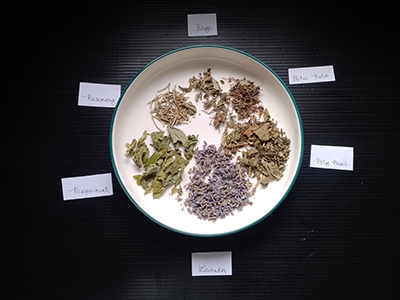 Ingredients
Ingredients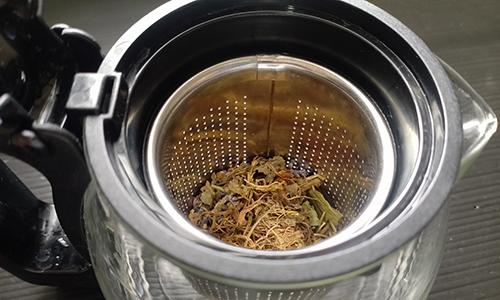
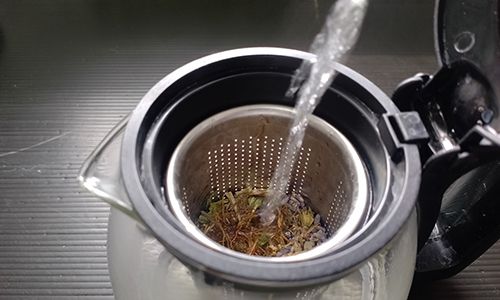
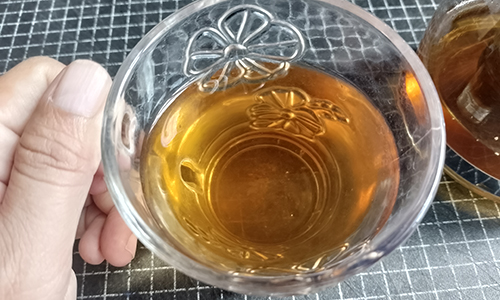
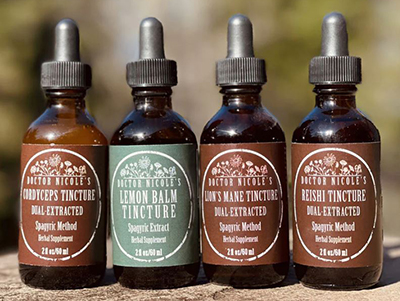
Are the herbs dried or fresh for the brain support tea? Can you make a larger batch and refrigerate it for use later? Thank you
Thanks so much for the information! I do well with nearly all the things listed — all except for Lion’s Mane and Holy Basil. They both cause depression for me! I’ve tried various forms/formulations of both with the same result every time. Any idea why this might be the case? Thanks again.